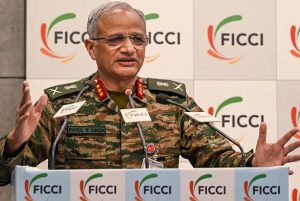Acknowledge Failure

Deputy Chief of Army Staff Lieutenant General Rahul R Singh’s candid revelations about Operation Sindoor at a FICCI event ‘New Age Military Technologies’ on 4 July in New Delhi bring home the fact that India faces a multi-pronged threat when it comes to dealing with its adversary on the western front – Pakistan. The four-day military confrontation between the archrivals was a complex engagement involving multiple actors, characterised by advanced intelligence sharing, real-time battlefield support, and coordinated military assistance. India, in fact, confronted three adversaries along one border – Pakistan, China and Turkey, with the latter countries offering extensive support to Islamabad that kept it ahead of India during the operation. These three were the known enemies but Singh’s statements indicated that there were other forces too that the Indian system was not prepared to face.
This collusive threat significantly alters India’s strategic considerations and defence preparedness, confirming that a multiple-front challenge is not merely a theoretical concept for the Indian military but a tangible danger. One of the most startling disclosures by Lieutenant General Singh was that Pakistan had complete awareness of Indian military deployments, a fact that became clear during the Director General of Military Operations (DGMO) discussions. “When the DGMO-level talks were going on, Pakistan actually was mentioning that ‘we know that your such and such important vector is primed and ready for action. I would request you to perhaps pull it back’. So he was getting live inputs … from China,” Singh revealed.
China’s direct role in supplying strategic military intelligence to Pakistan against India significantly changes the dynamics of the conflict. The Lieutenant General disclosed that 81 per cent of the military equipment Pakistan has procured over the past five years came from China. Thus, China has been using Pakistan as a “live lab” to evaluate the capabilities of its weapons systems. All this is pure commerce for China and pain for India. This also suggests that any conflict involving Pakistan serves as a testing ground for Chinese military technology. This enables China to enhance its defence capabilities for future engagements. Consequently, these improvements will be made accessible to Pakistan, better equipping it against India for any upcoming conflicts. A scenario too menacing for India to ignore.
Singh also highlighted vulnerabilities in the supply chain affecting indigenous defence systems, pointing out that equipment expected to be delivered by October-November 2024 was unavailable during Operation Sindoor in May 2025.
Turkey has also significantly supported Pakistan by supplying it with Bayraktar drones, hundreds of which swarmed over Indian cities along the western border. Ankara also trained Pakistani military personnel for the conflict with India. This highlights Turkey’s active involvement in bolstering Pakistan’s preparedness against India, suggesting a broader geopolitical alignment that goes beyond the traditional cooperation between Islamabad and Beijing.
Lieutenant General Singh’s statements coming weeks after similar revelations on India’s vulnerabilities during Operation Sindoor were made by CDS Anil Chauhan in Singapore and defence attaché Captain Shiv Kumar in Indonesia highlights the pressing challenges facing India’s defence strategy and the clear dissatisfaction with the political leadership. Threats from multiple fronts and the risk of intelligence breaches are critical issues that demand immediate attention and a strategic response. Military leadership getting candid in admitting the limitations in a country’s response to military threats is a sign for the government to act fast before it’s too late. Acknowledging that a problem exists is the first step towards finding a solution to it.
News